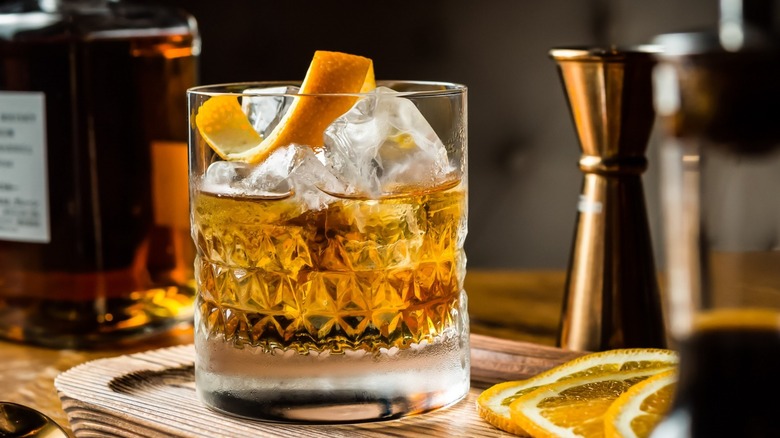Bitters Enhance Cocktails By Making The Flavor Burst
Every so often, you'll come across a cocktail recipe that asks for an ounce of this, a splash of that, a top-up of juice or soda, and to finish it all off, a dash of bitters. If you have everything you need except bitters, you may wonder if it's that important to include. Yes, it is. Think of bitters as the pinch of salt that's often needed in food. If you wouldn't pass over the pinch of salt that a recipe asks for, you shouldn't ignore bitters.
The origin of bitters can be traced back to the 1700s when spirits were originally infused with herbs to concoct medicine that was easy enough to drink without wincing. It wasn't until the early 1800s that bitters came to be used in cocktails. Today, bitters are made by infusing high-proof spirits with an array of botanicals, spices, and, in some cases, even fruits.
Although the first cocktail to use bitters was similar to a modern Old Fashioned, bitters can be added to just about any cocktail to elevate its taste. Much like salt does to food, a dash of bitters ties all the flavors of a cocktail together. It may seem like bitters will make any cocktail taste bitter — but that's not necessarily the case. The owner of James Beard Award-winning bar Cure, Neal Bodenheimer, told Vinepair that when making a cocktail, "you're putting disparate things together, and you need something to bridge them."
How to use bitters in cocktails
Making a cocktail taste more cohesive may be the primary role of bitters, but they can also be added for their flavor. For example, spiced bitters can bring a subtle heat to cocktails, celery bitters make an excellent addition to Bloody Marys, and chocolate bitters can highlight barrel-aged spirits. Plus, there are plenty of fruit-infused bitters to add to cocktails depending on the season: cranberry bitters to take holiday cocktails up a notch, fig and pear bitters to transform cocktails in the fall months, and bitters made from plums, cherries, apricots, and peaches to add a nice sweetness to drinks in the summertime.
According to Bodenheimer, the best bitters for home bartenders are Angostura bitters, followed by Peychaud's and orange bitters. If you want to see the difference that bitters can make for yourself, consider making classic drinks like an Old Fashioned, Manhattan, or Sazerac both with and without the bitters. Once you taste the results that a few drops of bitters can create firsthand, you'll see why bitters can be a game-changer in most cocktails.

